Numbers: Does Giving Up Your Soul Give You A Bigger Heart?
Weekly Numbers and Demographics Report
by Deanna Cantrell
My mother always said, ÔÇ£little pictures have big earsÔÇØ when referring to children and how one should behave around them.┬á ItÔÇÖs quite true, children are like sponges, they soak up their environments and observe the world around them.┬á This is the primary way they learn.┬á Theists often say that morality comes from religion, implying that nontheists are amoral.
A new study set out to measure altruism in children.┬á The sample size was 1,170 children aged between 5 and 12 years in six countries (Canada, China, Jordan, Turkey, USA, and South Africa), the religiousness of their household, and parent-reported child empathy and sensitivity to justice. Across all countries, parents in religious households reported that their children expressed more empathy and sensitivity for justice in everyday life than non-religious parents. Is this wishful thinking, or do they see what they want to see?┬á This is because religiousness was found to be inversely predictive of childrenÔÇÖs altruism and positively correlated with their punitive tendencies.┬á Together these results reveal the similarity across countries in how religion negatively influences childrenÔÇÖs altruism, challenging the view that religiosity facilitates prosocial behavior.
The data
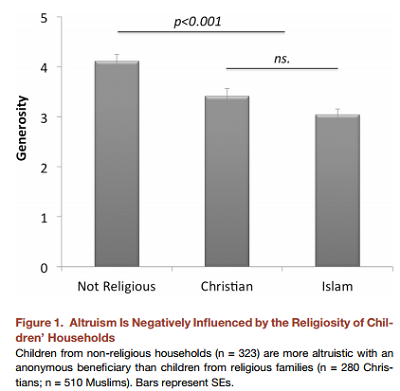 In the sample, 23.9% of households identified as Christian, 43% as Muslim, 27.6% as not religious, 2.5% as Jewish, 1.6% as Buddhist, 0.4% as Hindu, 0.2% as agnostic, and 0.5% as other. Results from an independent samples t test, comparing altruism in children from religiously identifying (Msharing = 3.25, SD = 2.46) and non-religiously identifying (Msharing = 4.11, SD = 2.48) households indicated significantly less sharing in the former than the latter (p < 0.001). To further investigate these effects within specific religions, three large groupings were religious identification on meanness rating (F(2, 767) = 6.521, p = 0.002, h2 = 0.017; Figure 3). Post hoc Bonferroni-corrected paired comparisons showed that children in Muslim households judged interpersonal harm as more mean than children from Christian (p < 0.005) and non-religious (p < 0.001) households, and children from Christian households judged interpersonal harm as more mean than children from non-religious households (p < 0.01).
In the sample, 23.9% of households identified as Christian, 43% as Muslim, 27.6% as not religious, 2.5% as Jewish, 1.6% as Buddhist, 0.4% as Hindu, 0.2% as agnostic, and 0.5% as other. Results from an independent samples t test, comparing altruism in children from religiously identifying (Msharing = 3.25, SD = 2.46) and non-religiously identifying (Msharing = 4.11, SD = 2.48) households indicated significantly less sharing in the former than the latter (p < 0.001). To further investigate these effects within specific religions, three large groupings were religious identification on meanness rating (F(2, 767) = 6.521, p = 0.002, h2 = 0.017; Figure 3). Post hoc Bonferroni-corrected paired comparisons showed that children in Muslim households judged interpersonal harm as more mean than children from Christian (p < 0.005) and non-religious (p < 0.001) households, and children from Christian households judged interpersonal harm as more mean than children from non-religious households (p < 0.01).
Moreover, children from religious households also differ in their ratings of deserved punishment for interpersonal harm (F (2, 847) = 5.80, p < 0.01, h2 = 0.014); this was qualified by significantly harsher ratings of punishment by children from Muslim households than children from non-religious households (p < 0.01). There were no significant differences between children from Christian households and non-religious households.  Religiousness positively predicted parent-reported child sensitivity to injustice and child empathy, even after accounting for age, SES, and country of origin (bstandardized = 0.194, p < 0.001; bstandardized = 0.89, p < 0.01, respectively).
Results from a univariate analysis of variance, with parent-reported justice sensitivity as the dependent variable and religious identification as the independent variable and age, SES, and country of origin as the covariates, revealed a significant main effect of religious identification on childrenÔÇÖs justice sensitivity (F(2,795) = 15.44, p < 0.001, h2 = 0.04; Figure 4). Children from Christian households were significantly higher in parent-rated justice sensitivity than children from Muslim households (p < 0.001) and non-religious households (p < 0.001).
What does this mean?
The study found that children who come from religious households are not only less altruistic, they also call for harsher penalties when they have been harmed.┬á Imagine that:┬á that old biblical eye for an eye message may be causing some harm.┬á Further study is required on this subject with larger sample sizes, however, this does bode well for nontheists.┬á Altruism is costly to self, there is no inherent reward.┬á It could be argued that theism is based around a model that emphasizes reward.┬á So, when no reward is offered the propensity for do-gooding decreases.┬á Dan Barker recently said during a speech, ÔÇ£Believers are outspired whereas nonbelievers are inspired.ÔÇØ┬á What he meant was theists find their inspiration and instruction from a book, nonbelievers find our inspiration and direction from within.
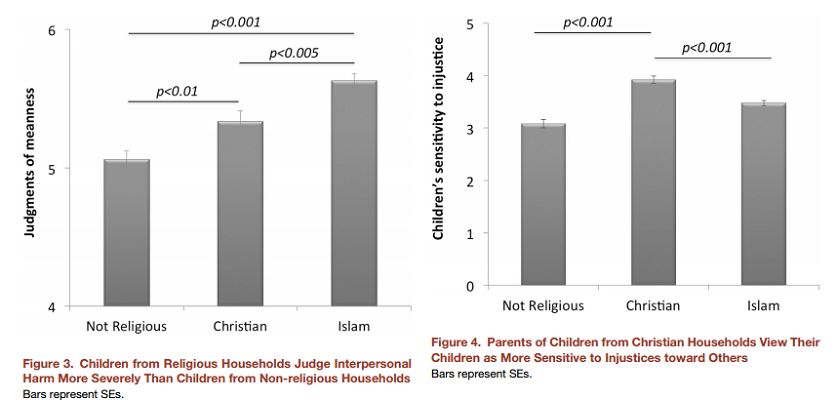
 SPI Send Thoughtful Letter Of Support┬á-┬áFollow the link below to view the letter that the Secular Policy Institute sent to President Fran├ºois Hollande regarding last weekÔÇÖs terrorist attacks.┬á We at the Secular Policy Institute express our deepest sympathies and sorrow for the actions of those few who permanently impacted the lives of so many.┬á We look to France as a beacon of culture and unity.┬á We are with you in this time. ┬áSee the
SPI Send Thoughtful Letter Of Support┬á-┬áFollow the link below to view the letter that the Secular Policy Institute sent to President Fran├ºois Hollande regarding last weekÔÇÖs terrorist attacks.┬á We at the Secular Policy Institute express our deepest sympathies and sorrow for the actions of those few who permanently impacted the lives of so many.┬á We look to France as a beacon of culture and unity.┬á We are with you in this time. ┬áSee the We are asking the National Association of Police Organizations to highly consider advising and educating police officers regarding the use of religious decals on secular government vehicles. These actions can be divisive and threatening toward the over thirty percent non-religious in the U.S.. The United States has two national mottos, of these “In God We Trust” was chosen to be placed as a decal upon police and sheriff cars. Unlike “In God We Trust” (which was adopted as a national motto in 1956 — mainly to counter communism), E Pluribus Unum has been with us since 1776. E Pluribus Unum is a far more accurate representation about what is best of America: “out of the many, one.”
We are asking the National Association of Police Organizations to highly consider advising and educating police officers regarding the use of religious decals on secular government vehicles. These actions can be divisive and threatening toward the over thirty percent non-religious in the U.S.. The United States has two national mottos, of these “In God We Trust” was chosen to be placed as a decal upon police and sheriff cars. Unlike “In God We Trust” (which was adopted as a national motto in 1956 — mainly to counter communism), E Pluribus Unum has been with us since 1776. E Pluribus Unum is a far more accurate representation about what is best of America: “out of the many, one.” Secular Policy Institute and our coalition partners remain steadfast supports of science-based medicine. We expect to find no better ally in advocating for medical science than the Secretary of Health and Human Services. Thus we ask the Secretary┬áto lobby the President and Congress to introduce Federal requirements to provide medical care for children against religious and philosophical objections from their parents. The Secretary’s┬áoffice has the leverage to educate lawmakers about science, and the importance of proper medical care. ┬áLet me know at┬á
Secular Policy Institute and our coalition partners remain steadfast supports of science-based medicine. We expect to find no better ally in advocating for medical science than the Secretary of Health and Human Services. Thus we ask the Secretary┬áto lobby the President and Congress to introduce Federal requirements to provide medical care for children against religious and philosophical objections from their parents. The Secretary’s┬áoffice has the leverage to educate lawmakers about science, and the importance of proper medical care. ┬áLet me know at┬á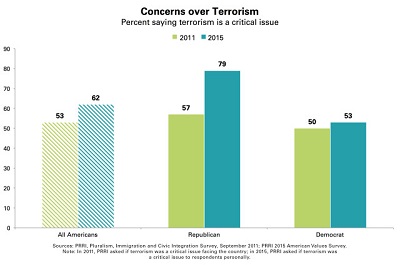 ┬á
  Researchers at the University of Washington in Seattle 
Researchers at the University of Washington in Seattle  SPI Fellow Mark Juergensmeyer is director of the Orfalea Center for Global and International Studies, professor of sociology and global studies, and affiliate professor of religious studies at the University of California, Santa Barbara. Who was the intended target of the attacks?  He offers poignant perspective on the attacks in Paris in his newly published article,
SPI Fellow Mark Juergensmeyer is director of the Orfalea Center for Global and International Studies, professor of sociology and global studies, and affiliate professor of religious studies at the University of California, Santa Barbara. Who was the intended target of the attacks?  He offers poignant perspective on the attacks in Paris in his newly published article, 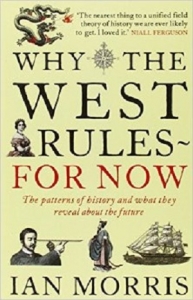
 Join SPI Coalition Member, The Freethought Society, in remembering a landmark court case.┬á December 6, 2015 The Freethought Society (FS) is pleased to be co-sponsoring a very special event with Ethical Humanist Society of Philadelphia (EHSP) and the Delaware Valley Chapter of Americans United for Separation of Church and State to mark the 10th anniversary of the ÔÇ£Intelligent DesignÔÇØ court case of Tammy Kitzmiller, et al. v. Dover Area School District, et al. (400 F. Supp. 2d 707, Docket No. 4cv2688). The Sunday, December 6, 2015 event starts with a free and open-to-the-public 11:00 AM, EHSP morning platform featuring Hugh Taft-Morales (EHSP Leader). This event will take place at the EHSP building located at 1906 South Rittenhouse Square Philadelphia, Pennsylvania 19103. The 2015 EHSP/FS Tree of Knowledge will be decorated after the platform speech and everyone is invited to participate. There will be music, singing, and books to purchase from authors. The official 10th Anniversary program starts with a luncheon service at 1:00 PM. The $30 program fee includes lunch, afternoon speakers, a cash bar ($5 wine and champagne) and Happy Hour Closing Ceremony (includes finger foods, music, a celebration cake and photo opportunities).┬á For more details on this event,
Join SPI Coalition Member, The Freethought Society, in remembering a landmark court case.┬á December 6, 2015 The Freethought Society (FS) is pleased to be co-sponsoring a very special event with Ethical Humanist Society of Philadelphia (EHSP) and the Delaware Valley Chapter of Americans United for Separation of Church and State to mark the 10th anniversary of the ÔÇ£Intelligent DesignÔÇØ court case of Tammy Kitzmiller, et al. v. Dover Area School District, et al. (400 F. Supp. 2d 707, Docket No. 4cv2688). The Sunday, December 6, 2015 event starts with a free and open-to-the-public 11:00 AM, EHSP morning platform featuring Hugh Taft-Morales (EHSP Leader). This event will take place at the EHSP building located at 1906 South Rittenhouse Square Philadelphia, Pennsylvania 19103. The 2015 EHSP/FS Tree of Knowledge will be decorated after the platform speech and everyone is invited to participate. There will be music, singing, and books to purchase from authors. The official 10th Anniversary program starts with a luncheon service at 1:00 PM. The $30 program fee includes lunch, afternoon speakers, a cash bar ($5 wine and champagne) and Happy Hour Closing Ceremony (includes finger foods, music, a celebration cake and photo opportunities).┬á For more details on this event,  With the recent attacks in Paris, we send support to our Coalition Member, Technoprog!.┬á Read their new article examining the genre of science fiction. ┬á┬á┬á
With the recent attacks in Paris, we send support to our Coalition Member, Technoprog!.  Read their new article examining the genre of science fiction.     SPI Coalition Member, The University of Northern Iowa Freethinkers and Inquiries has an article discussing just this topic:  people claiming that drinking bleach cures autism.  See the
SPI Coalition Member, The University of Northern Iowa Freethinkers and Inquiries has an article discussing just this topic:  people claiming that drinking bleach cures autism.  See the 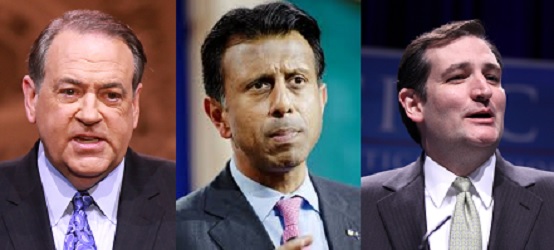 Sometimes I think Republicans get a bad rap from mainstream journalists, who tend to be more sympathetic to liberals and Democrats. The problem may be particularly acute when it comes to social conservatives, whose views seem especially unpopular among journalists.
Sometimes I think Republicans get a bad rap from mainstream journalists, who tend to be more sympathetic to liberals and Democrats. The problem may be particularly acute when it comes to social conservatives, whose views seem especially unpopular among journalists. A new list of targets
A new list of targets SPI Fellow Elizabeth Loftus appears in an interview that explores the topic of the ÔÇ£
SPI Fellow Elizabeth Loftus appears in an interview that explores the topic of the ÔÇ£ ecular invocation at a Chico California City Council meeting.┬á Soon after that invocation, the city council adopted a new rule that all invocations must be sixty seconds or less. To honor the sixty second rule, on November 3, 2015, George Gold will deliver Chico’s first ever secular Haiku invocation:
ecular invocation at a Chico California City Council meeting.┬á Soon after that invocation, the city council adopted a new rule that all invocations must be sixty seconds or less. To honor the sixty second rule, on November 3, 2015, George Gold will deliver Chico’s first ever secular Haiku invocation: The National Secular Society
The National Secular Society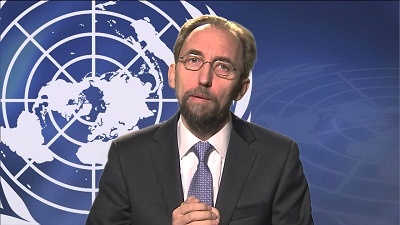
 attack in Dhaka, police said two other writers and a publisher were stabbed and shot at a publishing house.
attack in Dhaka, police said two other writers and a publisher were stabbed and shot at a publishing house.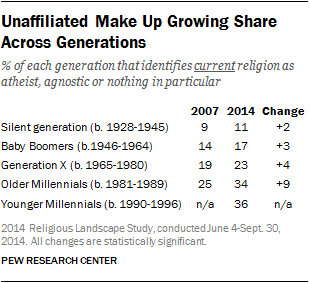 While attending The Freedom From Religion FoundationÔÇÖs annual convention last month I was privy to a conversation among a group of attendees.┬á They were discussing that the convention was ÔÇ£a sea of white headsÔÇØ and the general consensus was fear that faith may be making a comeback among Millennials.┬á According to a Pew Forum study, their fears are unfounded.┬á Now that is some real, good news.
While attending The Freedom From Religion FoundationÔÇÖs annual convention last month I was privy to a conversation among a group of attendees.┬á They were discussing that the convention was ÔÇ£a sea of white headsÔÇØ and the general consensus was fear that faith may be making a comeback among Millennials.┬á According to a Pew Forum study, their fears are unfounded.┬á Now that is some real, good news.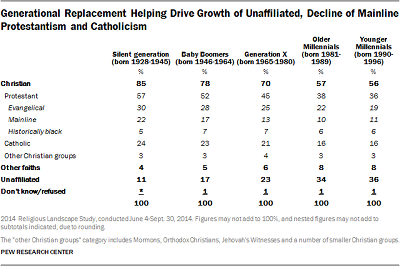 no religion.┬á As access to higher education and information increases are more Americans beginning to question what they were spoon fed during their upbringing?┬á According to Pew, more than 85% of Americans were raised Christian but nearly a quarter of those have left the ideology.
no religion.┬á As access to higher education and information increases are more Americans beginning to question what they were spoon fed during their upbringing?┬á According to Pew, more than 85% of Americans were raised Christian but nearly a quarter of those have left the ideology.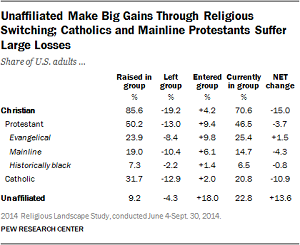 Candidates, especially the anti-establishment types in the Republican primary, have bemoaned the prevalence of special interests in politics. By definition, an interest group is a vocal minority or majority that wields an undue┬áamount of influence on the political process through sheer interest and engagement. If current trends continue, it’s conceivable that the label “special interest” could┬áapply┬áto those who vote based on religion.
Candidates, especially the anti-establishment types in the Republican primary, have bemoaned the prevalence of special interests in politics. By definition, an interest group is a vocal minority or majority that wields an undue┬áamount of influence on the political process through sheer interest and engagement. If current trends continue, it’s conceivable that the label “special interest” could┬áapply┬áto those who vote based on religion.